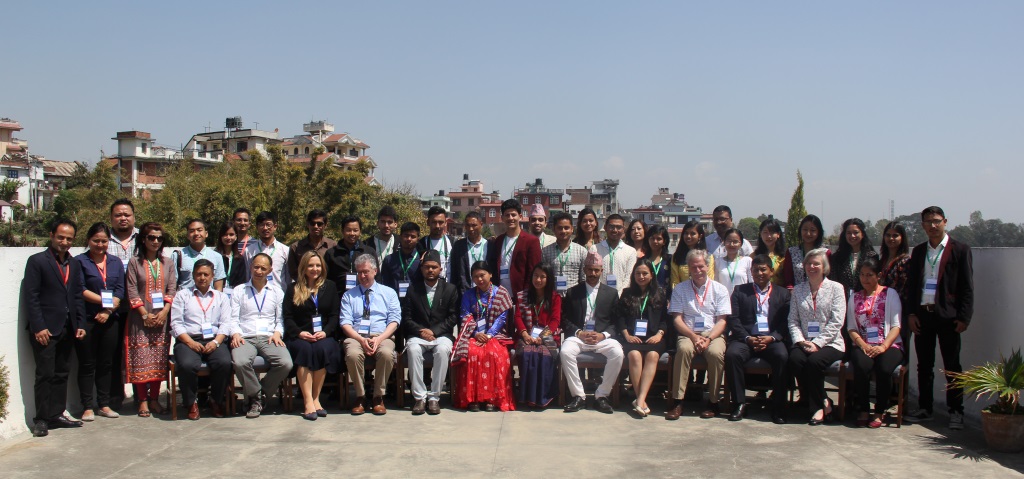
KATHMANDU, April 10 - The Intergovernmental Panel on Climate Change (IPCC), the UN body for
assessing the science related to climate change, will present its findings with a focus on South Asia at
a regional outreach event in Kathmandu on 11-13 April 2017.
It will also present its work programme for the Sixth Assessment Report (AR6) cycle at the event
hosted by the Ministry of Population and Environment of Nepal and the International Centre for
Integrated Mountain Development.
IPCC Bureau members and authors will participate in workshops as part of the three-day outreach
event, attended by policymakers, practitioners, scientists, civil society, business and media
representatives from South Asia.
"Mountain regions face particular vulnerabilities to climate change but various adaptation and
mitigation options exist to make society more resilient and create opportunities for a sustainable
future," said Joy Pereira, Vice-Chair of Working Group II of the IPCC. "This timely conference will
provide valuable guidance to policymakers and practitioners on addressing the challenges of climate
change".
Scientists will present the latest IPCC report, the Fifth Assessment Report (AR5), completed in 2014,
which was a crucial input to the Paris Climate Change Agreement reached in December 2015. AR5
found the world has the means to limit global warming and build a more prosperous and sustainable
future, but pathways to limit warming to 2ºC relative to pre-industrial levels would require substantial
emissions reductions over the next few decades.
"We would like to see the research community in Nepal and other developing countries tackle local
questions and provide us with scientific literature that can feed into the new AR6 and future
assessments.”, said Joy. “We also hope that more scientists from the region will be nominated as
IPCC authors across the range of topics that we assess."
For more information, contact:
Webpage of the event: http://ipcc.ch/apps/outreach/eventinfo.php?q=372
IPCC Press Office, Email: ipcc-media@wmo.int
Nina Peeva +41 22 730 8142 or +41 79 704 2459
Follow IPCC on Facebook, Twitter, LinkedIn and Instagram.
Notes for editors
What is the IPCC?
The Intergovernmental Panel on Climate Change (IPCC) is the UN body for assessing the science
related to climate change. It was established by the United Nations Environment Programme (UN
Environment) and the World Meteorological Organization (WMO) in 1988 to provide policymakers
with regular scientific assessments concerning climate change, its implications and risks, as well as
to put forward adaptation and mitigation strategies. It has 195 member states.
IPCC assessments provide governments, at all levels, with scientific information that they can use to
develop climate policies. IPCC assessments are a key input into the international negotiations to
tackle climate change. IPCC reports are drafted and reviewed in several stages, thus guaranteeing
objectivity and transparency.
The IPCC assesses the thousands of scientific papers published each year to tell policymakers
what we know and don’t know about the risks related to climate change. The IPCC identifies where
there is agreement in the scientific community, where there are differences of opinion, and where
further research is needed. It does not conduct its own research.
To produce its reports, the IPCC mobilizes hundreds of scientists. These scientists and officials are
drawn from diverse backgrounds. Only a dozen permanent staff work in the IPCC’s Secretariat.
The IPCC has three working groups: Working Group I, dealing with the physical science basis of
climate change; Working Group II, dealing with impacts, adaptation and vulnerability; and Working
Group III, dealing with the mitigation of climate change. It also has a Task Force on National
Greenhouse Gas Inventories that develops methodologies for measuring emissions and removals.
IPCC Assessment Reports consist of contributions from each of the three working groups and a
Synthesis Report. Special Reports undertake an assessment of cross-disciplinary issues that span
more than one working group and are shorter and more focused than the main assessments.
Sixth Assessment Cycle
At its 41st Session in February 2015, the IPCC decided to produce a Sixth Assessment Report
(AR6). At its 42nd Session in October 2015 it elected a new Bureau that would oversee the work on
this report and Special Reports to be produced in the assessment cycle. At its 43rd Session in April
2016, it decided to produce three Special Reports, a Methodology Report to update guidelines on
national greenhouse gas inventories and the AR6.
At its session in Guadalajara in March 2017, the IPCC considered the outlines of the Special Report
on the Ocean and Cryosphere in a Changing Climate, and Climate Change and Land: an IPCC
special report on climate change, desertification, land degradation, sustainable land management,
food security, and greenhouse gas fluxes in terrestrial ecosystems. The two special reports are
expected to be finalized in September 2019.
In September 2018 the IPCC will also finalize Global Warming of 1.5°C, an IPCC special report on
the impacts of global warming of 1.5°C above pre-industrial levels and related global greenhouse
gas emission pathways, in the context of strengthening the global response to the threat of climate
change, sustainable development, and efforts to eradicate poverty. The IPCC will also refine the
2006 IPCC Guidelines for National Greenhouse Gas Inventories for delivery in 2019.

